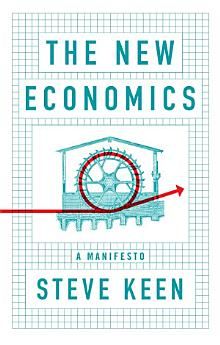Use, Value, and Exchange: The Misinterpretation of Marx
The original focus of my academic career was the misinterpretation of Marx by his supposed followers. This thesis, written in 1989-90 for my Masters degree at the University of New South Wales, led to my first two academic papers, both published in the Journal of the History of Economic Thought in 1993.[1] I subsequently moved on to other topics—notably modeling Minsky’s Financial Instability Hypothesis[2]—but the ideas in this thesis never left my mind. In fact, they formed the philosophical foundation for all of my subsequent work.
When I found myself, by sheer serendipity,[3] in Marx’s hometown of Trier to receive a prize for my academic contributions—the Friede Gard Prize for Sustainable Economics[4]—I felt it was time I made this thesis both more accessible and more presentable.
It has been posted on my websites for some years now, but the formatting was poor: I had originally written the thesis in the brilliant outline processor Framework, and formatted it using the equally brilliant desktop publishing program Ventura Publisher. Both of these programs were purchased by companies that truly didn’t understand their technology—Ashton-Tate in the case of Framework, and Corel Draw in the case of Ventura Publisher—and the programs eventually died. I was forced to port the text to Microsoft Word, and the porting process scrambled the footnotes (of which there are many—a total of 451 in the original and 471 in this document).
I ignored this problem and lived with the resulting somewhat unsatisfactory presentation. But now that I was in Marx’s hometown, I felt it was time to produce something that gave proper recognition to one of the greatest—but also one of the most flawed, and indeed the most misinterpreted—thinkers in the history of economics.
I have also appended a paper that shows how Marx’s dialectics can be the methodological foundation for Post-Keynesian economics—“A Marx for Post-Keynesians”. There’s a tale about why this paper was never published, but I’ll leave that as a mystery for now.
[1] Keen, S. (1993). "The Misinterpretation of Marx's Theory of Value." Journal of the History of Economic Thought 15(2): 282-300; Keen, S. (1993). "Use-Value, Exchange Value, and the Demise of Marx's Labor Theory of Value." Journal of the History of Economic Thought 15(1): 107-121.
[2] Keen, S. (1995). "Finance and Economic Breakdown: Modeling Minsky's 'Financial Instability Hypothesis.'." Journal of Post Keynesian Economics 17(4): 607-635.
[3] The Friede Gard Prize for Sustainable Economics (https://www.umwelt-campus.de/friede-gard-preis) is awarded annually at the Trier University of Applied Sciences, but the fact that this is Marx’s home town is sheer coincidence—since the founders of the prize happen to live nearby.
[4] https://www.umwelt-campus.de/campus/aktuelles/news/news-details/friede-gard-preis-2022.

The New Economics: A Manifesto
In 1517, Martin Luther nailed his 95 theses to the wall of Wittenberg church. He argued that the Church’s internally consistent but absurd doctrines had pickled into a dogmatic structure of untruth. It was time for a Reformation.
Half a millennium later, Steve Keen argues that economics needs its own Reformation. In Debunking Economics, he eviscerated an intellectual church – neoclassical economics – that systematically ignores its own empirical untruths and logical fallacies and yet is still mysteriously worshipped by its scholarly high priests. In this book, he presents his Reformation: a New Economics, which tackles serious issues that today's economic priesthood ignores, such as money,






